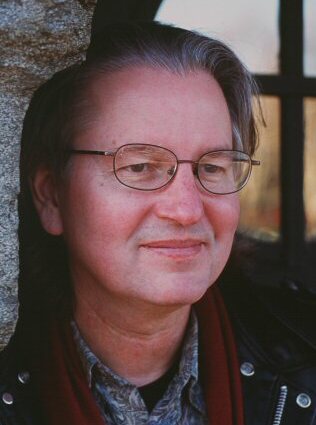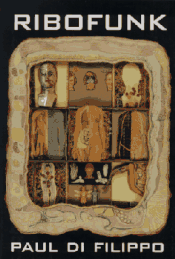
Michael Bruce Sterling is an American science fiction author known for his novels and short fiction and editorship of the Mirrorshades anthology. In particular, he is linked to the cyberpunk subgenre.

Biotechnology is a multidisciplinary field that involves the integration of natural sciences and engineering sciences in order to achieve the application of organisms, cells, parts thereof and molecular analogues for products and services.

Cyberpunk is a subgenre of science fiction in a dystopian futuristic setting that tends to focus on a "combination of lowlife and high tech", featuring futuristic technological and scientific achievements, such as artificial intelligence and cyberware, juxtaposed with societal collapse, dystopia or decay. Much of cyberpunk is rooted in the New Wave science fiction movement of the 1960s and 1970s, when writers like Philip K. Dick, Michael Moorcock, Roger Zelazny, John Brunner, J. G. Ballard, Philip José Farmer and Harlan Ellison examined the impact of drug culture, technology, and the sexual revolution while avoiding the utopian tendencies of earlier science fiction.

Hackers is an anthology of science fiction short stories edited by Jack Dann and Gardner Dozois. It was first published in 1996. It contains stories by science fiction and cyberpunk writers of the late 1980s and early 1990s about hackers.

A campaign setting is usually a fictional world which serves as a setting for a role-playing game or wargame campaign. A campaign is a series of individual adventures, and a campaign setting is the world in which such adventures and campaigns take place. Usually a campaign setting is designed for a specific game or a specific genre of game. There are numerous campaign settings available both in print and online. In addition to published campaign settings available for purchase, many game masters create their own settings, often referred to as "homebrew" settings or worlds.

Synthetic biology (SynBio) is a multidisciplinary field of science that focuses on living systems and organisms, and it applies engineering principles to develop new biological parts, devices, and systems or to redesign existing systems found in nature.
Since the advent of the cyberpunk genre, a number of cyberpunk derivatives have become recognized in their own right as distinct subgenres in speculative fiction, especially in science fiction. Rather than necessarily sharing the digitally and mechanically focused setting of cyberpunk, these derivatives can display other futuristic, or even retrofuturistic, qualities that are drawn from or analogous to cyberpunk: a world built on one particular technology that is extrapolated to a highly sophisticated level, a gritty transreal urban style, or a particular approach to social themes.
In September 2021, Synthetic Genomics Inc. (SGI), a private company located in La Jolla, California, changed its name to Viridos. The company is focused on the field of synthetic biology, especially harnessing photosynthesis with micro algae to create alternatives to fossil fuels. Viridos designs and builds biological systems to address global sustainability problems.

Many of the tropes of science fiction can be viewed as similar to the goals of transhumanism. Science fiction literature contains many positive depictions of technologically enhanced human life, occasionally set in utopian societies. However, science fiction's depictions of technologically enhanced humans or other posthuman beings frequently come with a cautionary twist. The more pessimistic scenarios include many dystopian tales of human bioengineering gone wrong.

GURPS Bio-Tech is a GURPS, the Generic Universal Role Playing Game, sourcebook that covers the implementation of biotechnology in the game. The first edition of the book was written for GURPS Third Edition, while the second edition of GURPS Bio-Tech was written for GURPS Fourth Edition. Both editions of the game are primarily focused on providing supplemental rules, campaign material, and examples of the uses of biotechnology for the players and game-master alike. The second edition contains two outlines for campaign settings but is primarily focused on providing rules and examples of devices that Game Masters could adapt for use in their own campaigns.

Mundane science fiction (MSF) is a niche literary movement within science fiction that developed in the early 2000s, with principles codified by the "Mundane Manifesto" in 2004, signed by author Geoff Ryman and "The Clarion West 2004 Class". The movement proposes "mundane science fiction" as its own subgenre of science fiction, typically characterized by its setting on Earth or within the Solar System; a lack of interstellar travel, intergalactic travel or human contact with extraterrestrials; and a believable use of technology and science as it exists at the time the story is written or a plausible extension of existing technology. There is debate over the boundaries of MSF and over which works can be considered canonical. Rudy Rucker has noted MSF's similarities to hard science fiction and Ritch Calvin has pointed out MSF's similarities to cyberpunk. Some commentators have identified science fiction films and television series which embody the MSF ethos of near-future realism.

DIYbio is an informal umbrella organization for individuals and local groups active in do-it-yourself biology, encompassing both a website and an email list. It serves as a network of individuals from around the globe that aims to help make biology a worthwhile pursuit for citizen scientists, biohackers, amateur biologists, and do-it-yourself biological engineers who value openness and safety. It was founded by Jason Bobe and Mackenzie Cowell in 2008.
Nanopunk refers to an emerging subgenre of science fiction that is still very much in its infancy in comparison to its ancestor-genre, cyberpunk, and some of its other derivatives.

The following outline is provided as an overview of and topical guide to science fiction:
A list of the published work of Paul Di Filippo, American author.

Aspects of genetics including mutation, hybridisation, cloning, genetic engineering, and eugenics have appeared in fiction since the 19th century.

Biology appears in fiction, especially but not only in science fiction, both in the shape of real aspects of the science, used as themes or plot devices, and in the form of fictional elements, whether fictional extensions or applications of biological theory, or through the invention of fictional organisms. Major aspects of biology found in fiction include evolution, disease, genetics, physiology, parasitism and symbiosis (mutualism), ethology, and ecology.

Solarpunk is a literary and artistic movement that envisions and works toward actualizing a sustainable future interconnected with nature and community. The "solar" represents solar energy as a renewable energy source and an optimistic vision of the future that rejects climate doomerism, while the "punk" refers to the countercultural, post-capitalist, and decolonial enthusiasm for creating such a future.













